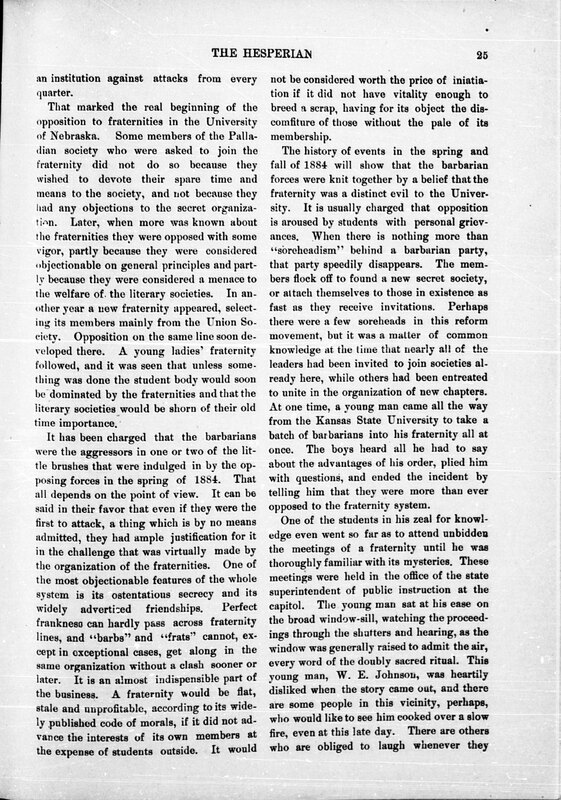THE BARBARIAN REVOLT.
Item
-
Title
-
THE BARBARIAN REVOLT.
-
Source
-
The Hesperian
"RG 38/01/02"
Periodical: Box: 3
Folder:
Archives and Special Collections, University of Nebraska-Lincoln Libraries
-
Rights
-
To inquire about usage, please contact Archives & Special Collections, University of Nebraska-Lincoln Libraries. These images are for educational use only. Not all images are available for publication.
-
extracted text
-
THE HESPERIAN 95
an institution against attacks from every
quarter.
That marked the real beginning of the
opposition to fraternities in the University
of Nebraska. Some members of the Palla-
dian society who were asked to join the
fraternity did not do so because they
wished to devote their spare time and
means to the society, and not because they
had any objections to the secret organiza-
Later, when more was known about
the fraternities they were opposed with some
vigor, partly because they were considered
objectionable on general principles and part-
lv because they were considered a menace to
the welfare of. the literary societies. In an-
other year a new fraternity appeared, select-
ing its members mainly from the Union So-
ciety. Opposition on the same line soon de-
veloped there. A young ladies’ fraternity
followed, and it was seen that unless some-
thing was done the student body would soon
be dominated by the fraternities and that the
literary societies would be shorn of their old
time importance,
It has been charged that the barbarians
were the aggressors in one or two of the lit-
tle brushes that were indulged in by the op-
posing forces in the spring of 1884. That
all depends on the point of view. It can be
said in their favor that even if they were the
first to attack, a thing which is by no means
admitted, they had ample justification for it
in the challenge that was virtually made by
the organization of the fraternities. One of
the most objectionable features of the whole
system is its ostentatious secrecy and its
widely advertized friendships. Perfect
frankness can hardly pass across fraternity
lines, and ‘‘barbs” and ‘‘frats” cannot, ex-
cept in exceptional cases, get along in the
same organization without a clash sooner or
later. It is an almost indispensible part of
the business. A fraternity would be flat,
stale and unprofitable, according to its wide-
ly published code of morals, if it did not ad-
vance the interests of its own members at
the expense of students outside. It would
tien,
not be considered worth the price of iniatia-
tion if it did not have vitality enough to
breed a scrap, having for its object the dis-
comfiture of those without the pale of its
membership.
The history of events in the spring and
fall of 1884 will show that the barbarian
forces were knit together by a belief that the
fraternity was a distinct evil to the Univer-
sity. It is usually charged that opposition
is aroused by students with personal griev-
ances, When there is nothing more than
‘‘soreheadism’’ behind a barbarian party,
that party speedily disappears. The mem-
bers flock off to found a new secret society,
or attach themselves to those in existence as
fast as they receive invitations. Perhaps
there were a few soreheads in this reform
movement, but it was a matter of common
knowledge at the time that nearly al! of the
leaders had been invited to join societies al-
ready here, while others had been entreated
to unite in the organization of new chapters.
At one time, a young man came all the way
from the Kansas State University to take a
batch of barbarians into his fraternity all at
once. The boys heard all he had to say
about the advantages of his order, plied him
with questions, and ended the incident by
telling him that they were more than ever
opposed to the fraternity system.
One of the students in his zeal for knowl-
edge even went so far as to attend unbidden
the meetings of a fraternity until he was
thoroughly familiar with its mysteries, These
meetings were held in the office of the state
superintendent of public instruction at the
capitol. The young man sat at his ease on
the broad window-sill, watching the proceed-
ings through the shatters and hearing, as the
window was generally raised to admit the air,
every word of the doubly sacred ritual. This
young man, W. E. Johnson, was heartily
disliked when the story came out, and there
are some people in this vicinity, perhaps,
who would like to see him cooked over a slow
fire, even at this late day. There are others
who are obliged to laugh whenever they
�



